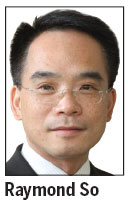Hong Kong Observatory: You can't please all the people all the time
Updated: 2013-08-22 06:45
By Raymond So(HK Edition)
|
|||||||||
Summer is the period in which typhoons will hit Hong Kong. Last week Typhoon Utor hit the city and the typhoon signal No 8 was hoisted. As a result, people were not expected to go to work and many had an extra morning off. However, the Hong Kong Observatory changed the signal to No 3 at 1:40 pm. According to established guidelines, employees need to return to work within two hours of the signal No 8 being lowered.
Many people complained about the Hong Kong Observatory's "inhumane" decision. Since the signal was changed at 1:40 pm, people were expected to return to work by 3:45 pm. If their office day ends at 5:00 pm, this means they only needed to work for 60 minutes, or so. In other words, people were expected to travel and struggle with the chaos and inconvenience for the sake of one hour's work. If the typhoon signal had instead been lowered at 2:00 pm, many companies would have allowed workers the day off. Hence, the change of typhoon signal at 1:40 pm was thought by many people to be "inhumane."

However, I don't agree with this view. The Hong Kong Observatory is supposed to report and forecast weather according to scientific grounds. If instead it makes decisions on human factors, then it is not scientific. Worst still, a humanistic approach to weather forecasting will damage the credibility of the Observatory, or could even hurt Hong Kong in the long run. The Observatory has established a good reputation given its scientific rigor. This is particularly important because many business decisions are related to weather decisions.
If weather decisions or typhoon signals are determined by unscientific procedures, there will be uncertainty over the validity of contracts. Also, if a typhoon signal remains posted for a long period, it affects air and ground transportation. Most people, however, only consider their own troubles in rushing back to work, but do not think of the chaos and trouble of travelers who need to stay at the airport and train station. In short, we cannot just look at one side and forget the others.
Nevertheless, this does not mean that the current system is faultless. The Observatory should maintain its professional and scientific standards, but the change should concern working hour guidelines under an adverse climate. Some companies already adopt a system in which employees need not return to offices even when the signal is lowered at 1:40 pm. Work hours "owed" by employees will be "repaid" later through extra work hours. In this way, workers need not commute in a chaotic transportation situation and the operation of the whole system can be maintained.
From a more macro point of view, the work hours of different occupations are totally different. It is therefore impossible to set rules on how to establish work arrangements after lowering a signal. If the signal is down at 2:00 pm, many people may not need to work in the afternoon, but others may still need to rush to work. Hence, there is never a good timing for the change in typhoon signal. One group may be happy while the others may not. In short, it is impractical to ask for a "humanistic" approach to determine the typhoon signals.
Being the largest employer in Hong Kong, the government should make clear their procedures of operation resumption after a typhoon. The government provides a good reference point for other companies. However, it must stress that the arrangements are indeed guidelines. The real issue still lies with how the employers and employees formulate a plan that both find acceptable.
The author is dean of the School of Business at Hang Seng Management College.
(HK Edition 08/22/2013 page9)